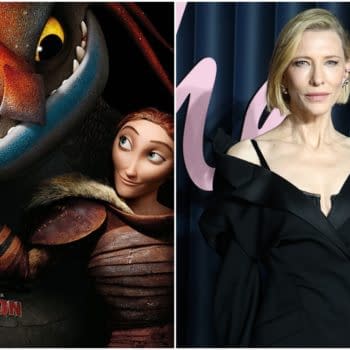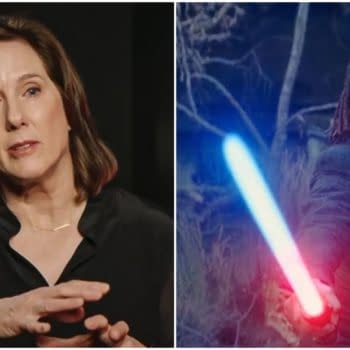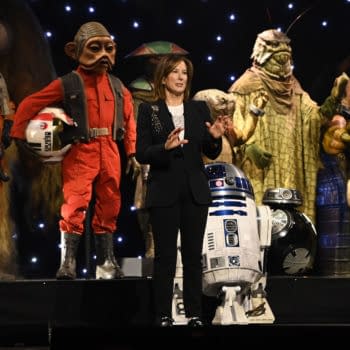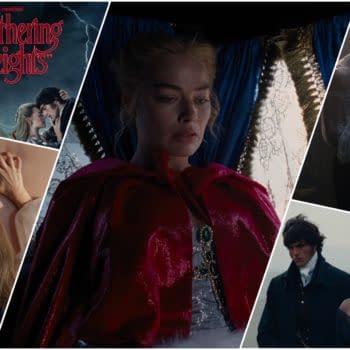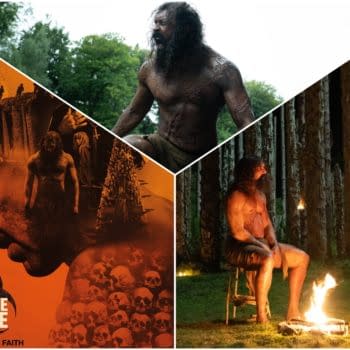Posted in: Movies | Tagged: Chazz Palmintari, Douglas Barr, entertainment, film, indy filmmaking, Lon Stratton, pre-production, Sweet Valley High, The Fall Guy
Film Schooling: Insider Insights On Indy Filmmaking Part 6 – Pre-Production, The Cinematographer, And First A.D.
By Chris Hood
(This is Part Six of an ongoing series to help educate aspiring filmmaker on the process of making their first film. Previous articles in this series can be found at BleedingCool.com and MovieIndustry.com)
Pressing on with your prime crew, it's now time to lock down the other two most important team members – the director of photography and your first assistant director. Both will have a tremendous bearing on the outcome of your picture, yet in vastly different ways.
Your D.P. (Director of Photography or Cinematographer) is the one in charge of capturing the director's vision. He's not "the guy who operates the camera," though on a smaller show he is often the primary guy who run it. On bigger shows, the D.P. has people that do most of the hands-on work for him – he won't actually move or set up the camera (though he'll say where to place it), he won't set up the lights to illuminate the shot (but he'll instruct those people as well), he won't change lenses or film (or digital storage devices) or pull the focus. The D.P. manages the technical process of setting up the shots, but on a big film, the D.P. rarely "gets his hands dirty" so to speak. He usually won't even push the button that starts and stops the camera. He's actually a lot like a wife – you do all the work, but she'll take the credit because she told you to do it in the first place…
And yet for all that, he is invaluable and often has a huge bearing on the finished product because he knows cameras and lenses and movement and lighting. And, hopefully, he's able to interpret exactly what the director envisions and is able to execute that as closely as possible to what can sometimes be a difficult to explain or even somewhat intangible idea.
Now, there are D.P.s who are practically directors, especially when it comes to setting up shots. On small films, D.P.s often end up making shot selections and in many cases are not just allowed, but expected to do so. On indy films, the D.P. is usually far more experienced than the director and the show can benefit from this.
Unfortunately, on my first film, I had a D.P., Lon Stratton, with relatively little experience and, it seemed, no sense of reality for the process of actually making movies. Time didn't interest him as a finite commodity and consequently often ended up in a battle. He'd have beautiful shots he wanted to set up, but when estimating 3 hours of prep, he'd be told we didn't have the time. "Give me the best lighting you can in 45 minutes," was a standard line on set and almost always resulted in him pouting. It often felt like he wanted to make every shot as perfect as possible as though he was putting together a promo reel to showcase his talents. Making every shot perfect is great in theory but absurd in actual application.
I think the crux of that relationship could be best summed up in one of our discussions that culminated in me saying "Look, Lon, I only have so much money to make this film. There is no more. Six months from now I'd rather have a finished film that looks pretty good than an unfinished one that's half done, looks great and will sit on a shelf forever." His response was priceless – "That doesn't make any sense to me at all." 'nuff said.
A D.P. that can complement the director in the areas he needs it can make all the difference. The weaker or more inexperienced the director, the most experienced the D.P. needs to be. (NOTE: on porn sets, you should call him the cinematographer because "D.P." has a totally different meaning….) The interesting thing is, although good D.P.s make big bucks on big films, like many other people on set, they are artists and love the creative process. If you have a project that excites them or they simply don't have other offers at that moment in time, you might be surprised at whom you can get at a reasonable rate. It's not far-fetched to think you can get someone with an amazing resume on $2k-$3k a week. I'm talking people who shoot BIG films. Studio films. Films we've seen in the theaters. Of course, this probably isn't going to happen on your little horror film (unless the script is amazing) or your soft core teen comedy, but aim high on this one. Too many indy films let the director shoot the project even if the extent of his experience is a few shorts during his film school tenure. (Yes, I know, there are cases of new directors who are also very talented D.P.s in their own right, but this is rarely the case.) D.P. and director are both two full time jobs on a set. Get a good D.P. so the director doesn't have to do double duty.
And who is the nemesis of the D.P. on your film? The First Assistant Director. Actually, your 1st A.D. is the nemesis of most people on the film. He's the guy who has to keep things moving, to keep things on schedule. He's the manager of the set. He's the chef behind the scenes working all the different ingredients to make sure they're all ready at the same time. It doesn't do any good for the gaffer to rush lighting to be done in 30 minutes if the actors are going to take 90 before they're camera ready. The 1st A.D. always, always, has multiple balls in the air and his goal is for them to all come down at the same moment.
He's also the "heavy" in most situations. If someone needs an ass chewing, it's often the 1st A.D. Someone needs a fire under their ass? – the 1st A.D. lights it. He's also the asshole proxy for the director or producer in most cases. If someone is going to be hated, it usually falls on the 1st A.D. If the director or producer needs to shit on someone, it's the 1st A.D. that usually pinches the loaf for them.
There are two kinds of 1st A.D.s, the "nice guys" and the "assholes." This became most evident to me working on a TV series called Sweet Valley High back in the mid-90s. We were shooting this dreadful Saved By The Bell knock off at the rate of one episode a week. Each week, principle crew would rotate out so one team would be prepping while the other was shooting. A good, workable system.
What was interesting was that although sometimes new directors would step in, like Douglas Barr of The Fall Guy fame (who surprisingly left his work on Sweet Valley High off his IMDB page…perhaps not so surprisingly), we alternated between Scott and Dan as the 1st A.D.s. Scott was the nice guy and the weeks he was running things always seemed to go more smoothly. Dan was the set Nazi. He loved to yell at people and give them shit. He cracked the whip and no one wanted to incur his wrath.
I always thought his approach was a bit of an act and I never really believed people got that angry over relatively minor problems. Sure, someone screwing up and almost getting someone hurt justifies a good, stern tongue lashing and chewing out (or firing in some cases) in front of everyone, but putting a prop in the wrong spot or bringing the wrong actor to set causing a 5 minute delay isn't worth instantly charging from 0-60 over (at least in the first offense).
The interesting dynamic of these two A.D.s was that we wanted to do well for Scott because we liked him, because he was a nice guy. We wanted to do well for Dan because we were afraid of being yelled at or fired if we didn't. So which is more effective? That's subject to debate. Is it better to be loved or feared? According to Chazz Palmintari in A Bronx Tale "It's better to be feared, because fear lasts longer." I'm not really sure which lasts longer, but both clearly last longer than Palminatri's career…
Now, I'm an even keel kind of guy. I don't yell at people on set. That's not who I am. I don't want a 1st A.D. who is going to yell at people around me. I don't believe it's the most effective way to motivate people. Of course, Dan is still working as an A.D. to this day, so he must be good at his job. Scott's set was more fun. Dan's was more business. They both seemed to get the job done, but you'd have to ask the producers which one they thought was more effective. Of course, we were working on Sweet Valley High, so maybe it's time to go back to that expression about polishing a turd…
Your 1st A.D. sets the pace and the mood of the production. His duties can be offset by a helpful, skilled Production Manager, but generally speaking, the 1st A.D. will determine whether or not you "make your day" (which means to get everything you were planning on getting that day).
If I were producing a film and was only able to have two experienced crew in the roles of Director, D.P. and 1st A.D., I would likely sacrifice the director on this one. A weak director can be aided tremendously by a good D.P. and A.D. There simply is no substitute for the other two and a weak person in either role will be painfully evident in the final product.
So, my young Padawan, until next week, hold your breath for more exciting nuggets of film brilliance! (Actually, don't hold your breath – I have enough deaths on my conscience as it is.)
Chris Hood is a writer, producer and director of such films as "Counterpunch" starring Danny Trejo and "Dirty Dealing 3D" with Michael Madsen and C. Thomas Howell. He is also owner of Robin Hood Films, a Las Vegas-based distribution company representing English language films around the world and operates a film blog at MovieIndustry.com. He's also dead sexy. (Mr. Hood denies any involvement in the creation of this mini-bio.)












